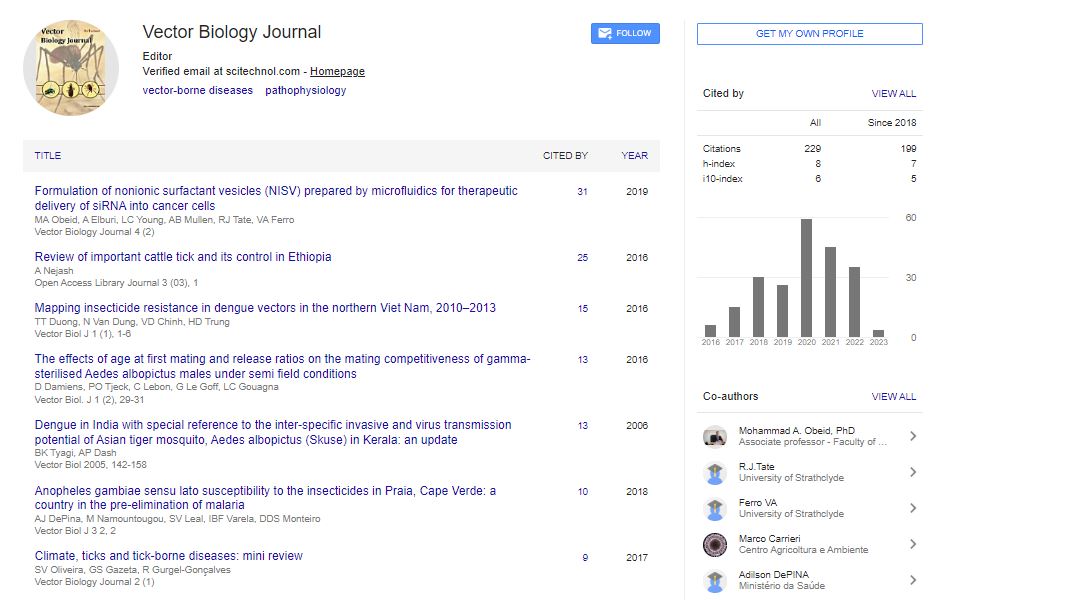Opinion Article, Vector Biol J Vol: 8 Issue: 3
Antibodies to Aedes spp. Salivary Proteins and its Control Efforts
Aljanahi Voet*
1Department of Haematology, Cancer Institute, University College London, London, UK
*Corresponding Author: Aljanahi Voet,
Department of Haematology, Cancer, Institute, University College London, London, UK
E-mail: Voet65@gmail.com
Received date: 28 August, 2023, Manuscript No. VBJ-23-117758;
Editor assigned date: 30 August, 2023, PreQC No. VBJ-23-117758 (PQ);
Reviewed date: 13 September, 2023, QC No. VBJ-23-117758;
Revised date: 21 September, 2023, Manuscript No. VBJ-23-117758 (R);
Published date: 29 September, 2023, DOI: 10.4172/2473-4810.1000272
Citation: Voet A (2023) Antibodies to Aedes spp. Salivary Proteins and its Control Efforts. Vector Biol J 8:3.
Description
Aedes mosquitoes, including Aedes aegypti and Aedes albopictus, are vectors for several arboviruses, such as dengue, zika, and chikungunya. This study delves into the emerging field of studying antibodies to Aedes spp. salivary proteins as a marker for mosquito exposure and potential disease transmission risk. Additionally, it explores the implications of this analysis for innovative control efforts to mitigate the impact of Aedes-borne diseases.
Aedes mosquitoes are notorious vectors of arboviruses, causing widespread morbidity and mortality in human populations across the globe. Aedes aegypti and Aedes albopictus are two of the most prominent culprits responsible for the transmission of diseases like dengue, zika, and chikungunya. Understanding mosquito-human interactions is important for the development of effective control measures. Recent study has begun to focus on antibodies to Aedes spp. salivary proteins as a potential biomarker of exposure to these vectors.
Antibodies to Aedes spp. salivary proteins
When Aedes mosquitoes feed on a host, they inject saliva containing a cocktail of bioactive molecules, including proteins, into the host's bloodstream. These proteins play a vital role in facilitating blood-feeding, with some serving as anticoagulants and others as immune modulators. As hosts mount an immune response to these salivary proteins, they develop antibodies against them.
This analysis has shown that individuals exposed to Aedes mosquito bites can develop antibodies to specific Aedes spp. salivary proteins. These antibodies serve as a marker for mosquito exposure, indicating that an individual has been bitten by an infected mosquito. This insight can be used to assess the risk of arbovirus transmission, as mosquitoes that feed on viremic hosts may subsequently transmit the virus to other individuals during subsequent blood meals.
Implications for disease control
Surveillance: The detection of antibodies to Aedes spp. salivary proteins can be used as a surveillance tool. It allows researchers to assess the prevalence and distribution of Aedes mosquito exposure in a given population, which, in turn, can inform the allocation of resources for disease control efforts.
Risk assessment: Identifying individuals with antibodies to Aedes spp. salivary proteins can help assess the risk of arbovirus transmission. This information can be used to target interventions in areas with a high risk of disease outbreaks.
Personalized prevention: Individuals with a history of Aedes mosquito exposure can take personalized preventive measures, such as the use of repellents or bed nets. This can be particularly useful for pregnant women and travelers to endemic areas.
Control efforts: Incorporating knowledge about antibodies to Aedes spp. salivary proteins into control efforts can help in the following ways:
Targeted vector control: Surveillance data on Aedes mosquito exposure can guide targeted vector control efforts. This may involve the application of larvicides and adulticides in areas with high exposure rates, focusing resources on the most at-risk populations.
Community engagement: Educating communities about the significance of these antibodies can enhance public awareness and participation in mosquito control programs. Community members can actively work to reduce breeding sites and protect themselves from mosquito bites.
Early warning systems: Using the presence of antibodies to Aedes spp. salivary proteins as an early warning system can enable rapid responses to potential disease outbreaks. It allows health authorities to mobilize resources and personnel promptly.
Vaccine development: Insights gained from studying antibodies to Aedes mosquito salivary proteins may contribute to the development of novel vaccines or therapies. By understanding the immunological responses triggered by mosquito exposure, researchers can design interventions that reduce the risk of disease transmission.
Conclusion
Aedes mosquitoes are formidable vectors of arboviruses that pose a significant public health threat worldwide. The recent exploration of antibodies to Aedes spp. salivary proteins offers a promising avenue for both surveillance and control efforts. By using these antibodies as markers for mosquito exposure, public health officials can better assess the risk of arbovirus transmission, implement targeted interventions, and engage communities in vector control efforts.
 Spanish
Spanish  Chinese
Chinese  Russian
Russian  German
German  French
French  Japanese
Japanese  Portuguese
Portuguese  Hindi
Hindi 